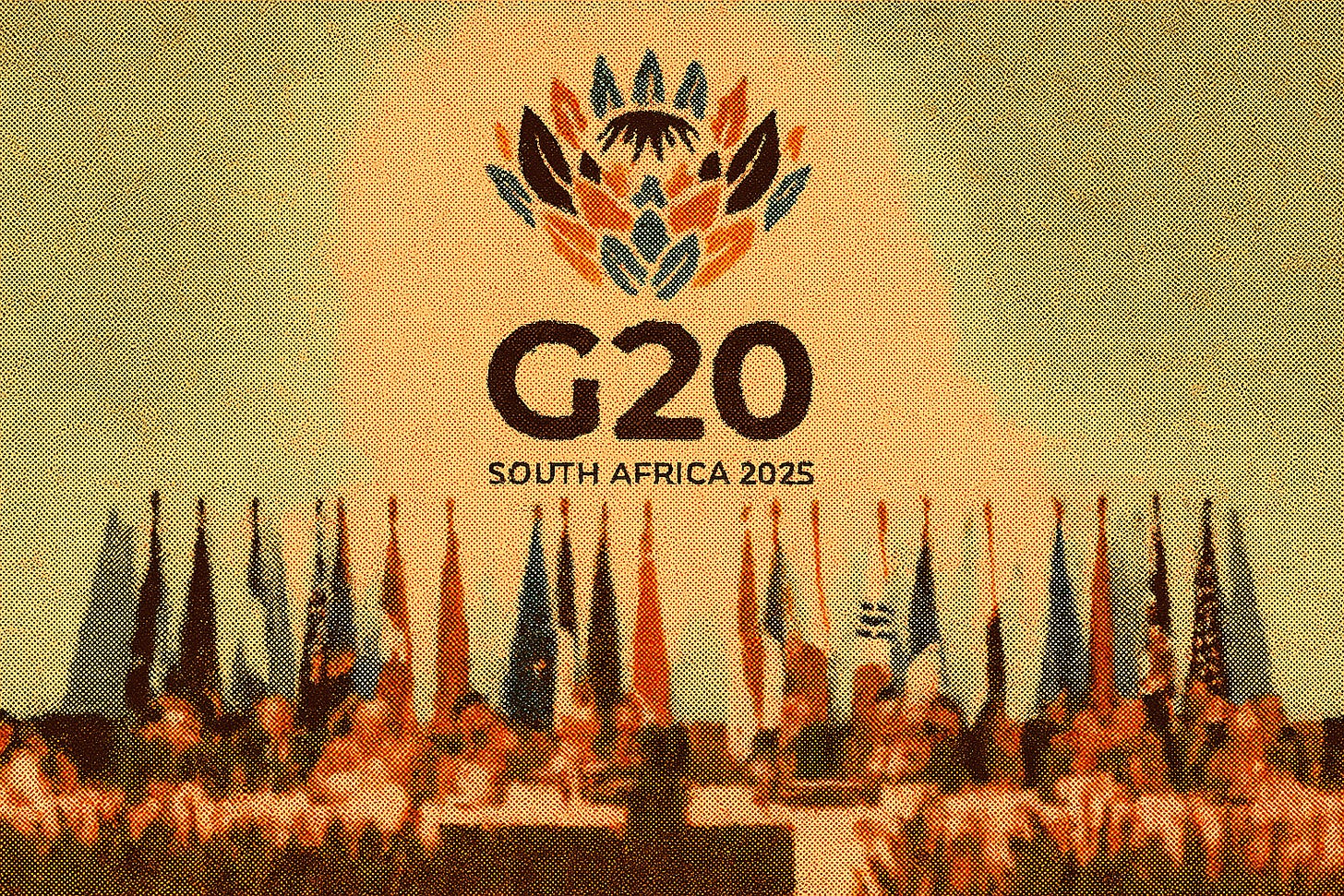The G20 and Performative Politics
The G20 is not a forum of reformers, it is a forum of incumbents.
As the final potholes are filled and the homeless are quietly removed around the G20 venues, it is the perfect metaphor for what the G20 has become: an expensive stage production still performed even when the general public has stopped paying attention. A city is cosmetically tidied up for a summit whose outcomes will be forgotten within days. If we are brutally honest it is just a kind of global political theatre where the set is real but the plot never moves forward.
The national government temporarily making things look functional, coordinated, and well-governed illuastrates perfectly the performative nature of the G20. Once the delegations leave, the cones come down, the roads are reopened, the underlying reality returns and the G20’s sweeping commitments evaporate back into domestic inertia and geopolitical tension.
History of G20
To understand the nature of the spectacle, one must start with a bit of history. The G20 group was created in 1999, initially as a meeting of finance ministers and central bank governors. The backdrop was a string of severe financial crises: Mexico in 1994, East Asia in 1997, Russia in 1998. The G20 was meant to be the world’s economic early-warning system, a place where policymakers from major advanced and emerging economies could coordinate to prevent future shocks.
Then came the 2008 financial crisis. As markets imploded, the G20 was elevated to leaders’ level. Suddenly, presidents and prime ministers gathered around a single table in Washington, London, and Pittsburgh, declaring themselves the new stewards of global economic stability. This was arguably the G20’s finest hour. The moment it claimed to have stepped into the breach to avert systemic collapse. It coordinated fiscal stimulus, expanded IMF resources, and oversaw the creation of the Financial Stability Board. In the steelman version of the G20 story, these were real achievements.
And to be fair, some were. Raising bank capital requirements under Basel III did improve resilience in the financial sector. Strengthening the IMF gave distressed countries more room to manoeuvre. The Financial Stability Board, for all its bureaucratic opacity, helped impose some order on cross-border banking risks. Even during COVID-19, the G20 managed a modest debt-relief initiative for low-income countries. These are not trivial accomplishments.
But they are accomplishments of a very particular sort: system-preserving, technocratic, and largely invisible to ordinary citizens. They are the achievements of a crisis-management cartel, not the reformative architects of a more dynamic global economy. And they raise an uncomfortable question: if the G20 was created to prevent crises, why has the world seen such a parade of them during its quarter-century of existence?
Since 1999, we have lived through the dot-com crash, the 2008 collapse, the Eurozone crisis, the COVID crash, and now a grinding affordability crisis across the globe affecting almost every major economy. Cynically seen the G20 has not prevented crises, it has merely presided over them. It has moved from one emergency to another, issuing communiqués filled with grave concern and lofty commitments, before quietly acknowledging that the next crisis has already arrived.
Performative politics
I have often written about the performative nature of South African politics, both by many formal political parties and many informal political organisations. Performative politics is the phenomenon of political players performing rituals of responsibility, competence and moral seriousness in place of actually governing. But the performative nature of politics is not limited to our sunny shores here at the southern tip of Africa. The G20 has become the globalised version of this instinct.
Consider the structure of a typical G20 summit. Leaders arrive to carefully choreographed handshakes and group photographs and the media report on the faint hot mic comments heard between the world leaders. These world leaders then sit around a circular table under a global collectivist slogan – “One Earth, One Family, One Future”, “Building our Common Future”, “Global Sustainable Development”, or this year’s evergreen favourite: “Solidarity, Equality and Sustainability” Behind them, hundreds of journalists report on the atmospherics. The communiqué, negotiated months in advance, always promises historic plans, inclusive growth and actionable frameworks.
Then everyone flies home. The frameworks remain un-actioned. The poor and struggling middle class remain unsupported. And the crises, far from prevented, continue.
The problem is not merely that the G20 fails to do what it claims. The deeper issue is that it does not even attempt the kind of reforms that genuinely improve prosperity. The G20 is not, and has never been, a champion of economic freedom or market liberalisation. It does not push countries to cut red tape, ease business formation, liberalise labour markets, reduce trade barriers, or create room for entrepreneurial dynamism. On the contrary: its agenda tends toward global tax coordination, regulatory harmonisation, and expanding multilateral financial conditioning, all measures that strengthen incumbent states, incumbent corporates, and incumbent bureaucracies.
In other words, the G20 is not a forum of reformers. It is a forum of incumbents. And incumbents rarely vote to disrupt themselves.
This helps explain why there is such a vast gap between the G20’s grand language and the economic realities experienced by ordinary people. The unprecedented fall in global poverty since the 1990s was not driven by G20 communiqués, but by domestic liberalisation in places like China, Vietnam, India and Eastern Europe. The G20 did not unlock their growth. Unilateral domestic reforms did. Likewise, the current affordability crisis burdening households from Cape Town to California is not being meaningfully addressed by G20 action. Inflation stabilisation, supply-chain resilience, and energy affordability are being tackled domestically while G20 declarations remain lost in the footnotes of summit documentation.
It demonstrates precisely how institutional performance has displaced institutional purpose. We know this pattern well at home: the ritual of promising transformation while entrenching stagnation. The G20 is simply the international version of the same instinct of symbolic politics detached from material improvement.
Conclusion
The tragedy is not that the G20 is malevolent. It is that it is comfortable. It is an institution insulated from consequences, whose primary output is performance. It succeeds at appearing busy, concerned and important. But it does not succeed at making the world’s economy more free, more competitive, or more resilient.
If the G20 wants to matter in the next 25 years, it needs something far rarer than diplomatic choreography. It needs intellectual courage. It must be willing to ask whether the global economy needs more competition, not more coordination and more freedom, not more frameworks.
Until then, the G20 will remain what it has become, a carefully lit stage on which leaders perform responsibility while crises continue behind its curtains.
More articles:
If you found this piece worthwhile, feel free to share it with someone who might appreciate it.
To get future essays delivered directly to your inbox, you can subscribe here:
I welcome thoughtful conversation—feel free to reach out on LinkedIn or follow along on Twitter.
An edited version of this article was published on BusinessDay. If you'd like to support my writing please subscribe and consider a pledge.
This cover image was created using Sora.







Spot-on! And ironically, given SA's attempts to paint Amrica as the "naughty kid", only America is honest about the emptiness/uselesness of the G20...